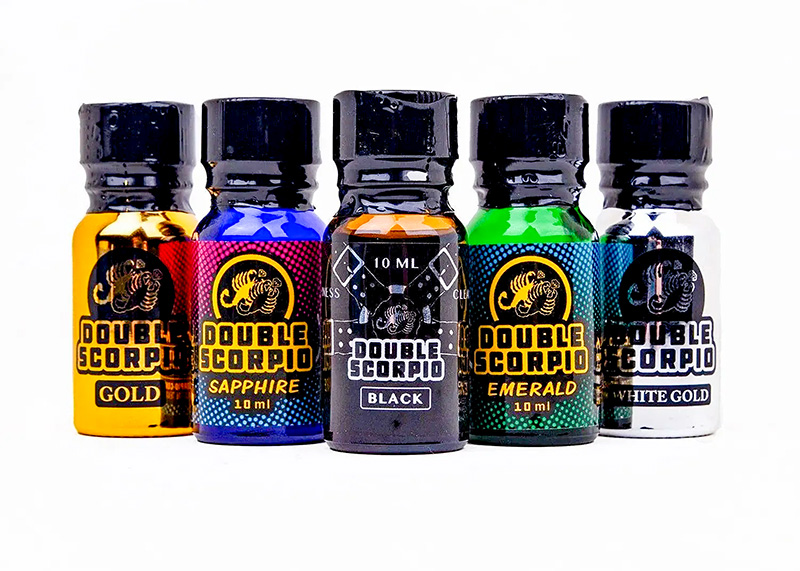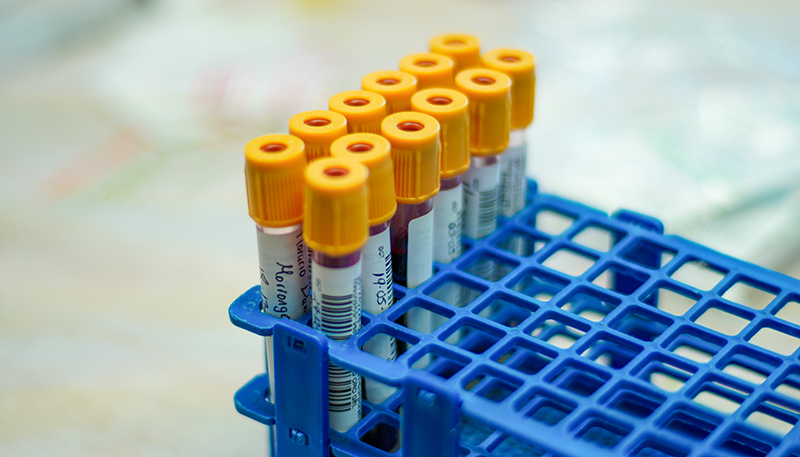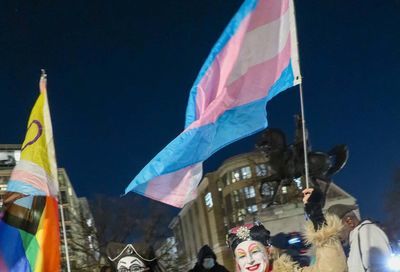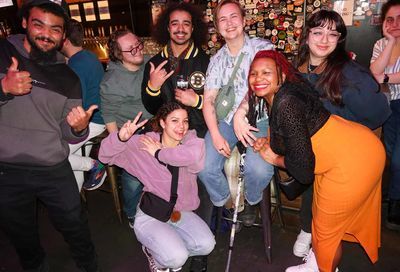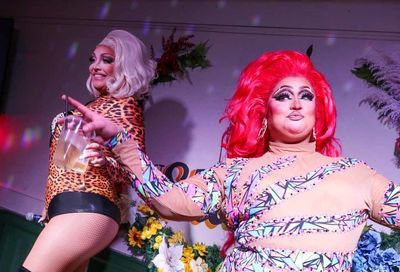Taking the Lead
Us Helping Us Executive Director Ron Simmons
Photography by Todd Franson
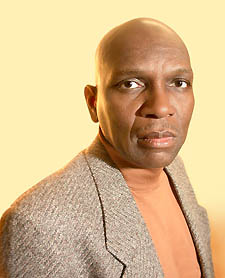 |
For some people, the southeast Washington area between South Capitol and Eighth Street along the Navy Yard is a place to pass through during the night on the way to a nightclub or bar.
For others, it’s a city neighborhood that’s struggled with poverty, drugs, crime and AIDS, but is now becoming a desirable business district, ready to lure office buildings and hotels to its rebuilt streets.
For Us Helping Us (UHU), one of the biggest gay-identified, black AIDS organizations in the country, the neighborhood is home. It occupies five buildings in the area around 8th and M Streets — an impressive feat for an organization that in the early nineties consisted of a small support group of HIV-positive black gay men meeting in living rooms. Now, the group is preparing to leave its original home for a newly purchased, soon-to-be-renovated headquarters on Georgia Avenue.
Since its early days, Us Helping Us has evolved into an agency providing an expansive range of HIV prevention and treatment services for the African-American community — heterosexual, homosexual, bisexual and transgender. And it’s this growth in scope and ambition that seems to most animate Ron Simmons, UHU’s executive director, when he talks about his long-time work with the group, and what he hopes they will be able to accomplish in the future.
Talking with Simmons one quickly realizes he’s not afraid to speak his mind, no matter how complex or contentious the issue. No surprise, perhaps, that he took such a vocal stand in favor of conducting HIV surveillance in D.C. using a names reporting system, a stand that led to a protracted and heated debate with gay and AIDS activists who, citing privacy and civil rights concerns, pressured the city to adopt a unique identifier system. While Simmons hopes people understand his stance from a public health viewpoint, he makes no apologies for making his case.
“I’m just trying to be honest about all things being considered, ” Simmons says. “I’m still trying to help black and brown people here. ”
That in itself seems a gargantuan challenge in a city with one of the highest rates of HIV infection in the nation, where AIDS continues to make rapid inroads through the black community. That’s why Simmons is dedicated to continue pushing UHU to serve the entire community, because they are all connected.
|
“I know that as the leader, as the progressive thinker who sees a big picture and is on a special mission, that’s where we’ve got to go, ” he says. “Us Helping Us has got to be us helping us. ”
METRO WEEKLY: How do you describe what Us Helping Us does?
RON SIMMONS: This is not what the mission statement says, but it’s really what we are doing — we’re a black, gay-identified organization, dedicated to reducing HIV infection in the entire African-American community. We specialize with the populations that are hard to reach. If you look at our programs, we’re working with heterosexuals, homosexuals, men having sex with men who identify as heterosexual men, heterosexual women, transgenders. One of the challenges we have is the perception that we’re not serving everybody, that we’re only serving gay men — we have to get D.C. communities to recognize the new Us Helping Us.
MW: What is your biggest program targeting men who have sex with men (MSM) and gay men?
SIMMONS: [Laughs.] That’s the other thirteen programs. We’re known for street and club outreach. We’ve been doing that for years, and if you don’t have an Us Helping Us condom kit somewhere in your belongings, then you’ve just been underground. We have case management for men who are HIV positive. We have both support groups and workshops for black gay and bisexual men, and transgenders, who are part of our community too.
We use that term MSM, but I differentiate between a gay man and an MSM. A gay man will tell you he’s a gay man — he sees himself as part of a gay community. An MSM could be a heterosexual man who has sex with men. [A soon to be released survey funded by the city] looked at over thirty six hundred black men and more than two thousand answered questions about sexuality. What made it unique was it didn’t go by labels, but by behavior. It wasn’t, “Are you gay, bisexual, heterosexual? ” It was by behavior. It broke down, interestingly, with five percent identified as only having sex with men, who one would say probably call themselves gay. Nine percent say they had sex with men and women equally, and another nine percent said they had sex mainly with women but sometimes men. That’s significant. We’ve already said that gay men, black or white, were just the tip of the iceberg — now we’re finding out from good scientific studies that, yes, there is a lot more to this. The challenge for Us Helping Us is how to serve all of them.
Our client base has changed. Years ago we had the reputation that we served the better boys, meaning that our clients were middle-class black gay men, educated, working, living with HIV. I just found out the other day that twenty percent of our case management clients are homeless. We have expanded and people have started to identify us as the place to go to for help. Which is a good thing.
MW: Is that expansion why Us Helping Us has bought a building to move its offices into?
SIMMONS: Well, this neighborhood is changing. Once the Navy Yard announced that they were going to move between five to ten thousand employees over here, all of the contractors who worked with them had to come with them. So, a military contractor needing office space? You buy the block, you build them an office building. Drive down M Street at night and see how lit it is with new street lamps, compared to the way it used to be when folks were cruising there after [a night at] Tracks. I just found out Starbucks is coming less than a block from here.
MW: Then it’s all over.
SIMMONS: [Laughs.] It’s all over. Being a struggling community-based organization (CBO), we could see the handwriting on the wall. We needed to start planning, so we just looked. Initially, the staff was more eager about looking for space than I, because I know how it’s all about dollars and cents. One of our volunteers, a real estate man, found something on Georgia Avenue. The staff looked at it and said, “We’ve just seen our new location. ” I’m like, “Oh, really. ” So I went to look. Everything we needed was there: the space, the subway, the bus lines — and that was a big issue because most of our clients use mass transit. Moving someplace where you’ve got to have a car wasn’t going to work.
Then the question became: Can we do it? I took it back to the board. It was one of the most heated board sessions Us Helping Us ever had. Finally, we decided to get outside, legal advice. [The law firm] went over every document, every paper, every grant agreement. When they had the final meeting with the board, they said, “You need to go for this. You can raise the money to do this, you’ve got the program, you’ve got the mission. It’s all there. ” So we went for it and purchased the building.
[Then the Washington AIDS Partnership] said, we’re going to give you an initial grant to hire capital campaign consultants to help you [raise the money]. We then went to the architect and asked what can this building really become, knowing who we are and the services we provide. He says, the first thing you need to do is make it totally ADA compatible — put in the elevator, excavate that basement so all the floors are level, new heating, new air, new everything — $600,000, just for the renovations.
Some days I say, “How did I get in this mess? ” I’ve suddenly got a million dollar commitment here, but it’s what Us Helping Us needed to go to the next level. We announced the 1.5 million capital campaign, and we’ve raised twenty percent of it so far from foundations. The building’s paid for, and we’ve got half of what we need to renovate. The goal is to move in before the year is out.
MW: Do you think you’ll reach that goal?
SIMMONS: We’re a little bit behind schedule from where I wanted us to be. There are some major hurdles we’ve yet to overcome, such as finding a contract bid that’s within reason. The architects warned us D.C. is a boomtown in terms of construction. When cranes are everywhere, contractors are like, “I don’t need you. I’ll do it for you but I’m going to charge you forty-five percent more than what it’s really going to cost. ”
But we pray every step of the way. We’re just taking it day by day. That’s why I’m bald. [Laughs.] If I seem manic, I just started taking HIV meds four days ago. Twenty years of being HIV positive and I just started them. I used to be a real fast talking person, but even I notice that I’m more so now. At home I’m doing five things at once. I’m like, “This isn’t like you. ” The medicine’s got me manic. It was difficult for me to decide to take meds.
MW: Why did you decide to go on meds now?
SIMMONS: My count dropped down to forty-six. My viral load was over seven hundred thousand. And I got sick in the fall. In no way do I take this as an indication that a holistic approach doesn’t work. Clearly, it worked for twenty years. That’s how I came to Us Helping Us, because the holistic approach is what we did. We never told people not to take drugs, but in [the early ’90s] there were no drugs worth taking. We said you don’t have to take something very toxic right now, and you can live with this thing. And that’s what our guys did. From 1991, when I joined UHU as a member, to 1996 when protease inhibitors came out, a whole lot of us were still alive because we were able to wait that long. A lot of guys died during that same period because the doctors told them there was no hope, and they didn’t think that a holistic approach could work.
So even after protease inhibitors came out I said, “No, I’m going to stick with this because if it ain’t broke why fix it? ” Well, now it’s broke. [Laughs.] Fortunately, I’ve seen friends take protease inhibitors for several years, and they’re doing fine. Life goes on. Of course, I had to go work through issues, like, what does this really mean? Is this the beginning of my demise? But other than making me manic, having an interesting dream here and there, I’m handling it.
And, again, it’s only been like five days. Come back in five weeks and I’ll tell you how well I’m handling it. The spirit has given me the opportunity to prolong my life even further, and continue on this incredible journey, and that’s how I look at it. And it has been an incredible journey.
 |
MW: Looking at the organization’s growth and the upcoming move, are you fearful that as Us Helping Us continues to expand its services, it might become less able to move in directions you want it to because when you get to a certain size there are more restrictions?
SIMMONS: I don’t know if size comes with restrictions, as opposed to restrictions that come with public money. I’ll worry about that when I’m there. But the challenge for us [is] where the whole African-American cultural base comes in. Some would argue that the difference between the white gay community and the black gay community is that the white gay community tends to separate itself more from the white heterosexual community — Dupont Circle, Chelsea, Castro. Black gays and lesbians have never tended to do that. Some would argue that’s because they never had resources to buy their own little enclave. Others would argue it’s because the relationship we have with our families is not one where we would do that. We may have our homophobic parents, but we’re all in the ‘hood, we’re all still oppressed as black people, we’re all going to still be together. So black people tend not to move away.
If a guy who is straight but gets his dick sucked a lot comes to me for help, am I going to tell him “No, because you’re not gay enough? ” He could be infecting gay men, the same way he could be infecting heterosexual women. We can’t separate it like that. Like it or not, we’re one community. In the pursuit of reducing HIV infection among black people you can’t separate it.
[For example] the D.C. HIV/AIDS Administration (HAA) gave us money in 2000 to do a needs assessment of transgenders. It was initially [transgender activist] Jessica Xavier’s idea to do it, and they put her under Us Helping Us to do it. We uncovered HIV needs, medical needs, housing needs, training needs, mental health needs. Based on our survey, transgenders may have one of the highest infection rates of any group in the city — we’re talking twenty-five to thirty-five percent. And the heterosexual men who are having sex with them are a main HIV transmission vector leading back to the heterosexual community. I’m not saying it’s all being done because of transgenders, I’m saying how this all ties together. Us Helping Us has got to do that work as we uncover that there are indeed those connections.
So we have started to work to empower transgenders. And there is no greater joy than to watch a disenfranchised, marginalized, broken, transgender woman — who her whole life has been told she’s less than shit — start coming to Us Helping Us support groups and work with Earline Budd and see her attitude change about who she is. It’s amazing.
MW: You’ve mentioned a number of times how impressed you are with HAA, and the lengths they’re willing to go to support community-based organizations. What are your thoughts about the current controversy and investigations at the agency?
SIMMONS: I’m not saying HAA is perfect — what bureaucracy with millions of dollars anywhere in the world is perfect? I will say that they’ve come a long way from where they used to be, when CBOs were going bankrupt waiting for payment. But what disturbs me is that a handful of people — and by that I mean the Gay and Lesbian Activists Alliance (GLAA) and ACT-UP — can bring everything to a grinding halt. Where are they getting that kind of clout? I would argue that they get that kind of clout because part of the dynamic that we don’t talk about in the gay community is racism.
Now, this is not me speaking for Us Helping Us — it’s how I personally see it. It doesn’t add up. If you claim that your interest is really helping people, why attack Us Helping Us? Because we dared go against you on names reporting, which is a political issue the way GLAA’s looking at it, but a health issue the way we’re looking at it? They got the mayor to change his position on HIV surveillance and names reporting, despite the fact that all of his advisors who had studied it for two years said, “Go with names reporting, it’s the most secure. It’s the easiest. ” The mistake we made was that we didn’t really prepare the public before it became an issue. When the Washington Post ran the story that the city was planning to have names reporting HIV surveillance, no one knew what that meant, and people started panicking. I was getting phone calls from men who I thought would know better: “Did you read the Post where the city’s going to start putting positive people’s names in the paper? ” [But] that’s not what’s about to happen.
GLAA and ACT-UP rode that confusion all the way and got it stopped, so we went to unique identifiers. And that wasn’t enough for them. So I always believed it was never a question of names reporting versus unique identifiers — [GLAA and ACT-UP] didn’t want HIV surveillance, period. The people they represent could get away with it, because they have the resources to go to private doctors and private health care and never show up on the public health radar screen. I know from experience that black and brown people ain’t got that — if they don’t get your name when they test you, they’re going to get your name the moment you walk in for free medical care or free drugs or housing assistance. They’re going to get your name, and they’re going to know everything about you. This is nothing new for black and brown people, because our lives are dependent upon public structures — and that means you’ve got to turn over who you are in order to get the help. So what’s the big to-do?
Now, how many tens of thousands of people are affected that way, versus the handful of folks who have the affluence to turn around the whole policy. And then what happens with HIV surveillance? [GLAA and ACT-UP] didn’t want the last four digits of the social security number included. Forty-two states went for names reporting the way we wanted to go. Eight states went for unique identifiers, only two of which, Illinois and Hawaii, won’t do social security numbers.
MW: Have you been involved at all with the creation of the unique identifier system at this point? Or have you washed your hands of it?
SIMMONS: Not so much washed my hands of it as they didn’t ask me to [become involved]. When the city pulled together the committee, I didn’t ask to be on it, and they didn’t ask me to be on it. I’ve got more than enough work to do without that. Now just go ahead and make it happen. Again, public health for [GLAA and ACT-UP] is not even the issue — it’s all the politics, and getting what’s in the interest of the people they represent. They could care less about the teeming tens of thousands of people who would really be impacted by all of this.
The problem is the CDC has said you have two years to pull this off. If it doesn’t work, a place like D.C. with one of the highest HIV rates in the country that desperately needs public dollars to deal with it, will get really screwed. We’re not in the position to take that kind of gamble. Most people don’t know that with unique identifiers, like it or not, they’ve got your name. That’s how they make the identifier. They just don’t send it to the health department. But in order to verify you, someone has to have your name and your unique identifier. Does that make you more secure than just going with names reporting, sending the name to the health department. HAA hasn’t had a breach of confidentiality with AIDS names reporting over twenty years. It was so common sense to me. And it’s common sense to anyone who’s really concerned about public health. It’s not common sense to our other friends, and unfortunately [GLAA and ACT-UP] have the political clout to turn everything on its head.
MW: How do you view the relations between the white gay community and the black gay community in D.C., aside from GLAA and ACT-UP?
SIMMONS: As a community?
MW: Yes.
SIMMONS: That’s difficult to answer, because I can think of individual white gay men who I can get along fine with. I know a lot of interracial couples who are quite happy. I have no problem with that whatsoever. I have told people if I ever met a white guy I really fell in love with I’m not going to give up love so I can please people who will talk about me no matter what I do.
But when you start going to a community level — and the interests of the institutions of those communities — then it’s a whole other world. The reason HAA is hated in some circles is because before Ron Lewis came, certain gay, white powerful institutions in this city could almost go down there and dictate policy. One thing Ron Lewis did when he came in was say, “We’re going to have a policy of following the disease, as it moves to other communities, and the money’s going to follow. We’re going to get local CBOs to do the work, so that means you will not get a multi-million dollar, multi-year contract to do everything. ”
Now, again, HAA isn’t perfect, but the way [GLAA and ACT-UP] talk about it you’d think it was [a disaster]. And this is where the racism comes in — because it’s all about class and power. [GLAA and ACT-UP] are willing to work with reactionary Republicans — the same ones that would burn them at the stake — to pull this off. Suddenly they’re talking to these conservative Republicans about investigating HAA, about how all those colored folks are just wasting money.
|
MW: Is it more of a race issue, or an economic class issue?
SIMMONS: To me it’s got to be a race issue, because in thinking of white gay men in need, their interests are not on the table here. It’s much more about high stakes [politics].
MW: If you do talk to individual white guys, then everyone says that race doesn’t have anything to do with problems between the communities.
SIMMONS: White gay men are not the largest male gay group in the city, but you still have clubs that are virtually one hundred percent white. You also have clubs that are one hundred percent black. The communities are still quite separate. That’s because America is still quite separate, and getting more separate rather than coming together, because of local politics. What we have to do is make sure we’re doing our work, that there are no shenanigans going on. But it’s interesting. We’ve been around for three years getting federal funding as part of the Congressional Black Caucus (CBC) minority AIDS initiative. The argument [for that initiative] was that black and brown CBOs are not getting the support that white CBOs, gay or straight, are getting so we need to put some money out on the street to fund them.
We also know that as new organizations come into money, a lot of infrastructure problems arise. You’ve got an organization that’s been living hand-to-mouth for years, doing good work, helping people. Then hand them a million dollars: they don’t have the accounts, the computers, the software to handle it. So the CDC planned to spend millions of dollars on technical assistance and capacity building to help them get on their feet.
Us Helping Us falls right into that. We had a good record, had demonstrated we were able to get that money, and get some technical assistance. But three years later, all bets are off. Now it’s about, “We’ve been giving this money to these colored people all this time, what have they done with it? Audit them! ” So out of all the agencies [federally] funded in D.C., the one they come to audit is Us Helping Us. Should I feel paranoid about that? I’ve got a wait and see attitude, but I really think that the plan is this: we don’t want to give money to those CBC groups anymore, so what we’re going to do is investigate them — find the obvious weaknesses that you would expect to find in an agency that just got money and doesn’t really know the regulations like the back of their hands. Play it up, say it was a waste of money, and pull the money back.
MW: Wouldn’t it be fair though, also, to note that Stop AIDS in San Francisco and other gay groups that aren’t minority CBOs have also been heavily scrutinized and audited?
SIMMONS: Because of the ideologies involved. If one was really cynical, it’s always safe to attack the sexual cutting edge of San Francisco — it doesn’t mean that the real goal is to end that relationship where you’re going to be funding things for white gay men. But if you go after the CBC, which is much smaller, much weaker, then given the racism of this country, you’ve really made a much more strategic move. I could be wrong on that — and in some respects I hope I’m wrong on that.
MW: Some things in public health, like names reporting and, to a certain extent, partner notification, tend to get associated with right wing politics, regardless of their public health benefit. Does it makes it harder to convince GLAA or other groups that those are valid public health programs because you have far right politicians advocating for such things as linking names reporting and partner notification programs?
SIMMONS: Yes, that’s a definite threat that I would in no way be in favor of. But ask black women about names reporting and contact tracing. They love it. They’re getting infected by these men who are not revealing that they’re infected. They would like to be able to find out. But I don’t think there should be any kind of mandatory exposing of people. And that’s not the way partner notification is now.
MW: Do you think there’s a misunderstanding or assumption among political activists about where the black community comes down on issues like partner notification?
SIMMONS: Well, yes. Because the communities are so separate. If you go by what you see on Black Entertainment Television or hear from the black friends you have, then you’re going to get one perspective. But in terms of what the average black person, particularly in a place like D.C. where it’s so separate socially, economically, and one could even say politically, yeah, you get a lot of misunderstanding. I’m not surprised. Once the black community started hearing about names reporting without being told what it really was, I knew what the reaction was going to be. Because you’re dealing with people who are rightfully paranoid to begin with, because they know that the government has never had anything in its interest on a large scale that has turned out in their favor. The lip service says, “This is in your favor. Welfare reform will help you. Three strikes, you’re out will help you. Urban renewal will help you. ” Yeah, right.
At some point it’s just that you’re trying to do something good like making sure that my people don’t get infected and to help those who are infected. You’ve got these other huge forces circling around you. What I want to do is really quite simple, but I’ve got to contend with these forces that have nothing at all to do with what I’m trying to do. It’s scary at times trying to juggle all this, but I can always say to myself, “Ultimately you just need to help your people, because that other battle is not yours, it’s the Lord’s. ” There are some things that are so overwhelming and beyond your impact that you really just have to turn it over to the Lord. If indeed they decide that the war on terrorism is going to require all HIV prevention money, you join the fight, you do the protest, you do the letters. But if the bulk of the country, which is not like you, decides that taking that money makes sense to them, it’s all over but the shouting.
MW: What do you think the perception of you is out in the community?
SIMMONS: I really don’t know. I’m always surprised when folks say things like, “Oh, Ron, you don’t know the influence you have. ” I’m dodging bullets right and left here. When you’re trying to meet a $60,000 payroll every two weeks, the last thing I think about is what people think when they hear “Ron Simmons. ”
If I got into that, I couldn’t do the spiritual work. And I know once I start getting into that, I’ve lost it. I need to be about my work. The capital campaign folks said to me, “You’re well known and respected among the black gay and lesbian community. The black straight community knows of you, but they’re not quite sure who you are. But the white population really don’t know who you are — that’s your challenge, because the community that knows you well will probably not be able to generate $1.5 million for your capital campaign. ” But that’s what a challenge is — how do we get the word out about who we really are and how many people we help.
On Friday, February 7th, in honor of National Black AIDS Awareness Day, UHU will hold a conversation and dinner with Ron Simmons and UHU Board Chairman Dr. Alvin Williams, who will share their thoughts on HIV/AIDS and the black community, and the ongoing role of Us Helping Us. UHU will provide HIV testing until midnight.
For more information on Us Helping Us and its programs, call 202-546-8200 or visit www.ushelpingus.com.
Support Metro Weekly’s Journalism
These are challenging times for news organizations. And yet it’s crucial we stay active and provide vital resources and information to both our local readers and the world. So won’t you please take a moment and consider supporting Metro Weekly with a membership? For as little as $5 a month, you can help ensure Metro Weekly magazine and MetroWeekly.com remain free, viable resources as we provide the best, most diverse, culturally-resonant LGBTQ coverage in both the D.C. region and around the world. Memberships come with exclusive perks and discounts, your own personal digital delivery of each week’s magazine (and an archive), access to our Member's Lounge when it launches this fall, and exclusive members-only items like Metro Weekly Membership Mugs and Tote Bags! Check out all our membership levels here and please join us today!




